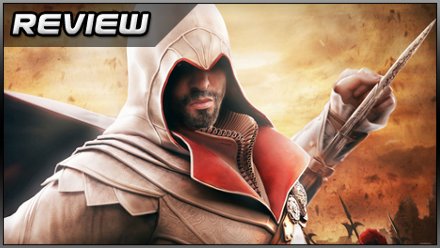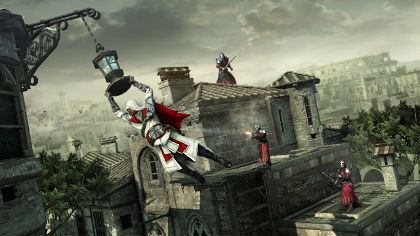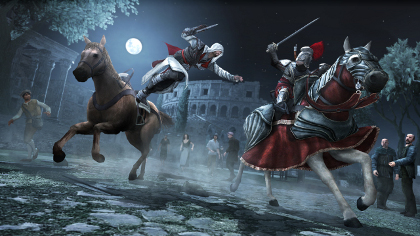
Templar agents appear to have infiltrated Ubisoft’s mastering labs, and are doing their utmost to prevent the spread of the Creed. The debug code we received last week had corrupted files, and while the promo copy that arrived on Friday is bug-free, we’ve had great difficulty accessing the multiplayer servers. Expect thoughts on the online modes later this week (assuming those launch hang-ups are resolved soonish) – in the meantime, here’s the lowdown on the Assassin’s Creed: Brotherhood campaign.
Assassin’s Creed is the great, white-hooded hope of the big budget console market – proof that the fruits of traditional publishing models can be original to the point of eccentricity and still haul in the megabucks. The last instalment’s plot reads like 12 Monkeys meets the Da Vinci Code with a hearty injection of heaving bodice: in theory it stars Ezio Auditore, a purring, unshaven killer locked in a Europe-wide war with the 15th century equivalent of SPECTRE, but in reality the leading man is Desmond Miles, Ezio’s descendent, who re-enacts genetically inherited memories via the Animus VR machine in order to unravel global shenanigans in the present.
AC’s blend of gameplay conceits remains unique, even three years post-debut, dunking Splinter Cell’s gizmo-facilitated stealth and Prince of Persia’s gliding parkour into Grand Theft Auto’s sandbox (less the cars, of course). As Desmond cum Ezio, players must stalk and snuff out a cast of entertainingly overdone classical personalities, tucked into the crevices of a scrumptious-looking open world – weaving together lissom chains of hops, scurries, shimmies and scrambles to get around at roof level, or proceeding under cover of the mob.

Besides guns, Ezio will eventually get his hands on the silent-but-deadly crossbow and poisoned throwing knives.
It’s the sort of hair-brained collision of concepts you’d expect to sell a million or two at the outside, given adequate promotion, however capable the execution. But here we are, for whatever reason, with total all-platform sales in the region of 19 million units.
The franchise is Ubisoft’s Modern Warfare, in a probably questionable nutshell, and the publisher has taken appropriate steps. Teams have been expanded. Cross-property products, like film spin-offs and Facebook apps, have been optioned. Development windows have been shortened to keeps step with demand – the original had four years in the oven, the second game two, the third game one. With the technology in place, pending the usual optimisations, and the design proven, Ubisoft is out to milk this unlikely union of paradigms for all it’s worth.
In that regard, Assassin’s Creed: Brotherhood may mark the start of a downward curve. Though a fun, substantial game in its own right, its contribution to the series basically consists of pasting in an epilogue to Assassin’s Creed 2 while doodling across the margins, warming the crowd up for a “proper” sequel. What there is in the way of fresh ideas feels sketchy, even perfunctory. Take the “brotherhood” mechanic itself, for instance. With the ranks of the assassins badly depleted after years of persecution by the Borgia family, Ezio must recruit new blood from the population of Rome.
Once signed up, junior assassins dog their master’s footsteps invisibly and can be sent against targets with a click of left bumper, dropping from eaves or charging out of alleyways on horseback. Once conjured, they’ll hang around till all the throbbing red blips on the radar have been extinguished, then beat it round a corner and de-materialise.
As agreeable as it can be to orchestrate the slaughter of an entire brigade while lounging undetected on a bench, the tactical possibilities don’t get much meatier than fire-and-forget. You can’t instruct your recruits to protect VIPs, for instance, or set their engagement parameters (ranged, stealthy, in-your-face, etc), or marshal them beside you boyband-video-style for an extra-stagy advance on somebody’s front gate. Nor can you kit them out to taste. A levelling meta-game allows assassins to earn customisation points by completing missions outside Rome, but as there are only two, predetermined upgrade paths, weapons and armour (aka Attack and Defence), you can’t help wondering why Ubisoft bothered to invoke the notion of character development at all.

The AI isn't as touchy as that of the original, where riding at a gallop - let alone stabbing another horseman - was cause for instant execution.
There’s never the sense that assassins are truly beholden to the player, that they’re more than swanky smart-bombs or percentage-of-success bars, that they have a place in the narrative beyond pitching in whenever the boss could really do without the fuss and nonsense, darlings. And Ezio hardly needs a hand. Despite losing his top-tier armour and a few more advanced gadgets during the lengthy preamble (later to be reclaimed from Leonardo da Vinci, at a price), the old dog’s deadlier than ever.





 Satoru Iwata Video Interview - the late Nintendo president spoke with Kikizo in 2004 as 'Nintendo Revolution' loomed.
Satoru Iwata Video Interview - the late Nintendo president spoke with Kikizo in 2004 as 'Nintendo Revolution' loomed. Kaz Hirai Video Interview - the first of Kikizo's interviews with the man who went on to become global head of Sony.
Kaz Hirai Video Interview - the first of Kikizo's interviews with the man who went on to become global head of Sony. Ed Fries Video Interview - one of Xbox's founders discusses an epic journey from Excel to Xbox.
Ed Fries Video Interview - one of Xbox's founders discusses an epic journey from Excel to Xbox. Yu Suzuki, the Kikizo Interview - we spend time with one of gaming's most revered creators.
Yu Suzuki, the Kikizo Interview - we spend time with one of gaming's most revered creators. Tetris - The Making of an Icon: Alexey Pajitnov and Henk Rogers reveal the fascinating story behind Tetris
Tetris - The Making of an Icon: Alexey Pajitnov and Henk Rogers reveal the fascinating story behind Tetris Rare founders, Chris and Tim Stamper - their only interview? Genuinely 'rare' sit down with founders of the legendary studio.
Rare founders, Chris and Tim Stamper - their only interview? Genuinely 'rare' sit down with founders of the legendary studio. The History of First-Person Shooters - a retrospective, from Maze War to Modern Warfare
The History of First-Person Shooters - a retrospective, from Maze War to Modern Warfare
awsome review,to bad the main campaign it’s so short,but when i think how many sidequest and side missions are, hidden chest and flags and many more stuffs to do,it wort buy and play. What i want to know if there are more locations besides Rome!